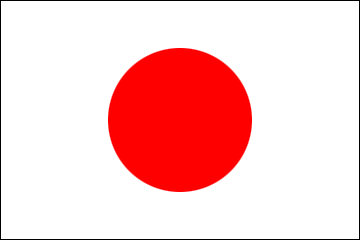Japan-Kenya Policy Workshop on Sports
2017/6/22
In the more than 50 years Japan-Kenya diplomatic relations have existed, sports has played a crucial role in strengthening our ties. With a view to review and thus further enhance the already cordial ties, especially in light of the upcoming Tokyo 2020 Olympic and Paralympic Games, the Embassy of Japan in Kenya held a Policy Workshop on Sports. The policy workshop addressed two main issues: how Japan-Kenya relations have benefited from sports exchange and what Kenyans can learn from Japan-Kenya Sports exchange.
The Policy Workshop was held at the Embassy of Japan on Thursday, June 22, 2017. The workshop had a varied audience including officials from the Ministry of Sports, Culture & the Arts, officials from the Embassy of Japan in Kenya, officials from various sports federations in Kenya, sports men and women in fields including volleyball, athletics, boxing and martial arts, media personalities and friends of Japan and Kenya.
The panelists for this discussion were Mr. David Lungaho, Head Coach, National Women’s Volleyball; Ms. Esther Wanjiru, Olympian, Women’s Marathon, 2000 Sydney Olympics; Dr. Richard Ndubai, Director General, National Youth Service and Mr. Yasunori Nakamura, Director, Japan Information & Culture Centre, Embassy of Japan. As a moderator, Mr. Elias Makori, Sports Editor, Daily Nation, participated in the discussion.
The Policy Workshop was officially opened by H.E. Toshitsugu Uesawa, Ambassador of Japan to Kenya and Mr. Maina Kamau, Commissioner of Sports, Ministry of Sports, Culture & the Arts. Mr. Raphael Muiruri, Deputy Secretary, State Department of Sports read remarks on behalf of Ambassador Peter Kaberia, Principal Secretary, State Department of Sports Development, Ministry of Sports, Culture & the Arts.
In his opening remarks, Ambassador Uesawa highlighted instances where Japan-Kenya sports relations have borne fruit such as the fact that Kenya’s first gold medal in the men’s marathon in the World Championships and Olympics were won by Japan based athletes (Mr. Douglas Wakiihuri and the late Samuel Wanjiru respectively), the over 30 year presence of Japanese coaches in the national women’s volleyball team which contributed to Kenya’s participation in the World Cup in 1995 and the Olympics in 2000 and the training of karate in various institutions including the Kenya Police and Defense Forces.
Mr. Kamau, in his remarks, shared that he was a beneficiary of Japan-Kenya sports relations in 1982 when he was trained by one of the Japanese volleyball coaches here in Kenya. He noted that Japan-Kenya relations in sports run long, deep and have been beneficial. Mr. Kamau also recognized that the defining characteristic that leads to the high caliber of athletes who train in Japan is discipline, a characteristic which sports men and women in Kenya should hone.
Ambassador Kaberia, through Mr. Muiruri, stated that sports enhance people to people relations because it transcends race, religion and gender. He applauded the stress Japan places on fair play and ethical behavior. Ambassador Kaberia concluded his remarks by highlighting some of the areas that should be considered for future partnership between Japan and Kenya including exchange programs and attachment programs for training, education, management and infrastructure development, exchange of technology infrastructure for research.
Following the opening addresses, the panelists took to the stage.
Mr. Lungaho was the first of the panelists to comment on the discussion. He recognised that Japan has sent top level coaches to Kenya to train the national volleyball team. Furthermore, the Kenyan team has severally trained in Japan and with the skills acquired, the players and coaches have been able to train the younger players back home. Due to the contribution Japan has made to the team through the years, the Kenya volleyball national team has been able to maintain its status as an African champion and also participate on the world stage (Volleyball World Cup and Olympics).
Speaking of her experience, Ms. Wanjiru recalled that as a student in Japan, there was no discrimination between the Japanese students and herself, they were all taught as one. She was taught to take pride in herself as an individual and in the sport she had chosen to devote herself to. She was also encouraged to share her dream and was then challenged to achieve it.
Dr. Ndubai is a karate black belt holder, a feat he was able to achieve due to Japan-Kenya sports relations. He observed that sports is about social relations. He noted that two years after the National Youth Service (NYS) was initiated, Japan through the Japan International Cooperation Agency (JICA) sent a plant mechanic to NYS. This plant mechanic taught karate informally to NYS and the generally public. Through these voluntary efforts of karate masters, Mr. Ndubai, and many other Kenyans have been able to learn karate. He concluded his remarks by stating that discipline, self-control and fairness when dealing with others are learnt through sports.
Mr. Nakamura gave his remarks from the point of view of how Japan has benefitted through Japan-Kenya sports relations. Mr. Nakamura noted that previously, especially in the 1980s and 1990s, Kenyans who had trained in Japan would compete internationally and bring medals back to Kenya. Nowadays, the trend is being reversed; Japanese athletes are training in Kenya in order to learn its strength. Further to this, Mr. Nakamura remarked that the basis of diplomacy is in the grassroots where ordinary people can feel and understand each other. Sports has gone a long way in enhancing diplomacy at this level.
The final session of the policy workshop was a question and answer session. Some of the questions raised were:
Ambassador Uesawa wrapped up the session. In his closing remarks, he stated that discipline is about how to live life. It is a lifelong endeavour.
The Policy Workshop was held at the Embassy of Japan on Thursday, June 22, 2017. The workshop had a varied audience including officials from the Ministry of Sports, Culture & the Arts, officials from the Embassy of Japan in Kenya, officials from various sports federations in Kenya, sports men and women in fields including volleyball, athletics, boxing and martial arts, media personalities and friends of Japan and Kenya.
The panelists for this discussion were Mr. David Lungaho, Head Coach, National Women’s Volleyball; Ms. Esther Wanjiru, Olympian, Women’s Marathon, 2000 Sydney Olympics; Dr. Richard Ndubai, Director General, National Youth Service and Mr. Yasunori Nakamura, Director, Japan Information & Culture Centre, Embassy of Japan. As a moderator, Mr. Elias Makori, Sports Editor, Daily Nation, participated in the discussion.
The Policy Workshop was officially opened by H.E. Toshitsugu Uesawa, Ambassador of Japan to Kenya and Mr. Maina Kamau, Commissioner of Sports, Ministry of Sports, Culture & the Arts. Mr. Raphael Muiruri, Deputy Secretary, State Department of Sports read remarks on behalf of Ambassador Peter Kaberia, Principal Secretary, State Department of Sports Development, Ministry of Sports, Culture & the Arts.
In his opening remarks, Ambassador Uesawa highlighted instances where Japan-Kenya sports relations have borne fruit such as the fact that Kenya’s first gold medal in the men’s marathon in the World Championships and Olympics were won by Japan based athletes (Mr. Douglas Wakiihuri and the late Samuel Wanjiru respectively), the over 30 year presence of Japanese coaches in the national women’s volleyball team which contributed to Kenya’s participation in the World Cup in 1995 and the Olympics in 2000 and the training of karate in various institutions including the Kenya Police and Defense Forces.
Mr. Kamau, in his remarks, shared that he was a beneficiary of Japan-Kenya sports relations in 1982 when he was trained by one of the Japanese volleyball coaches here in Kenya. He noted that Japan-Kenya relations in sports run long, deep and have been beneficial. Mr. Kamau also recognized that the defining characteristic that leads to the high caliber of athletes who train in Japan is discipline, a characteristic which sports men and women in Kenya should hone.
Ambassador Kaberia, through Mr. Muiruri, stated that sports enhance people to people relations because it transcends race, religion and gender. He applauded the stress Japan places on fair play and ethical behavior. Ambassador Kaberia concluded his remarks by highlighting some of the areas that should be considered for future partnership between Japan and Kenya including exchange programs and attachment programs for training, education, management and infrastructure development, exchange of technology infrastructure for research.
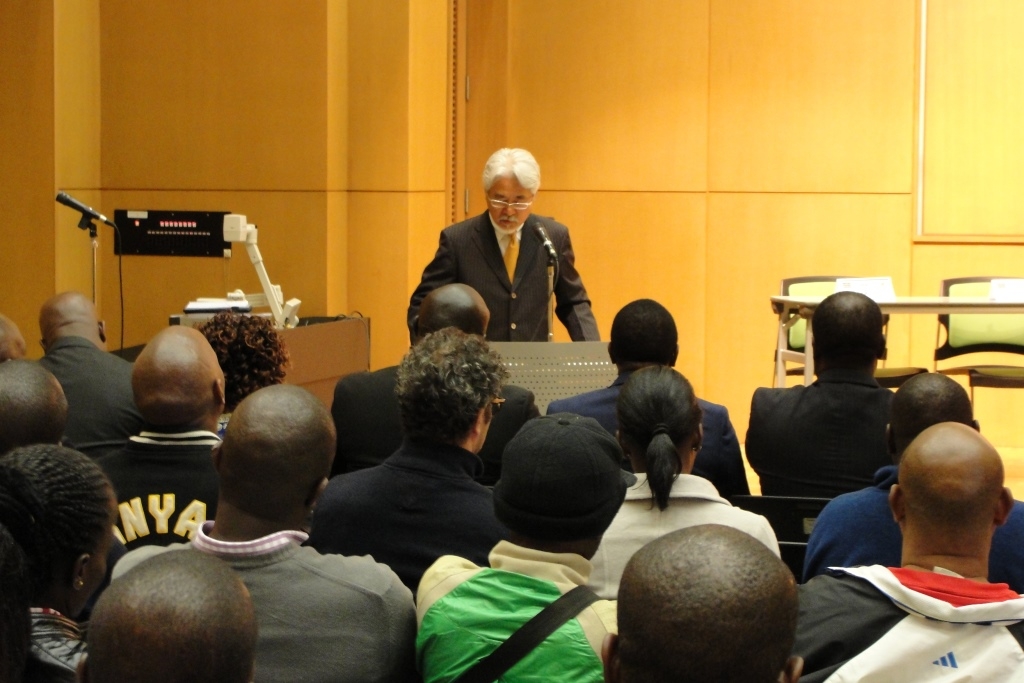
Amb. Uesawa giving his opening remarks
|
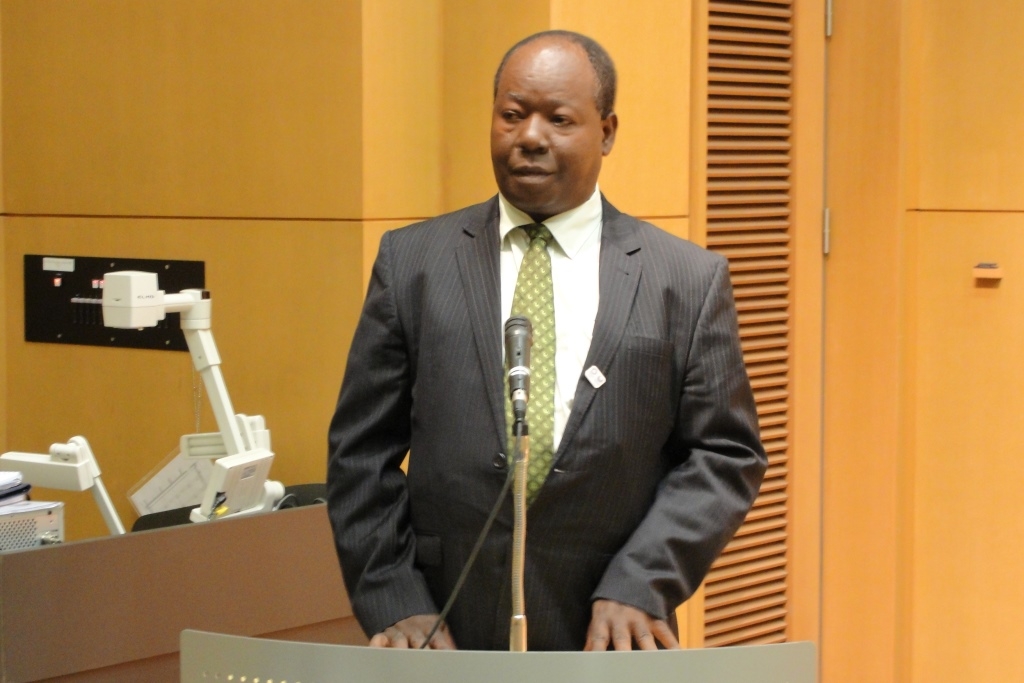
Mr. Kamau giving his opening remarks
|
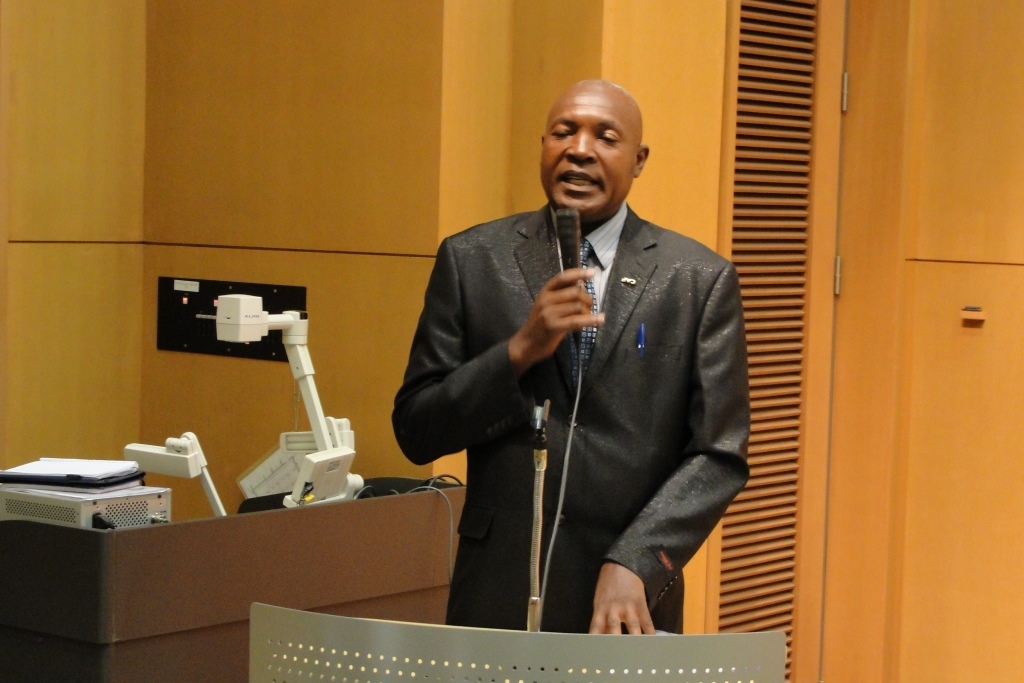
Mr. Muiruri giving remarks on behalf of Amb. Peter Kaberia
|
Mr. Lungaho was the first of the panelists to comment on the discussion. He recognised that Japan has sent top level coaches to Kenya to train the national volleyball team. Furthermore, the Kenyan team has severally trained in Japan and with the skills acquired, the players and coaches have been able to train the younger players back home. Due to the contribution Japan has made to the team through the years, the Kenya volleyball national team has been able to maintain its status as an African champion and also participate on the world stage (Volleyball World Cup and Olympics).
Speaking of her experience, Ms. Wanjiru recalled that as a student in Japan, there was no discrimination between the Japanese students and herself, they were all taught as one. She was taught to take pride in herself as an individual and in the sport she had chosen to devote herself to. She was also encouraged to share her dream and was then challenged to achieve it.
Dr. Ndubai is a karate black belt holder, a feat he was able to achieve due to Japan-Kenya sports relations. He observed that sports is about social relations. He noted that two years after the National Youth Service (NYS) was initiated, Japan through the Japan International Cooperation Agency (JICA) sent a plant mechanic to NYS. This plant mechanic taught karate informally to NYS and the generally public. Through these voluntary efforts of karate masters, Mr. Ndubai, and many other Kenyans have been able to learn karate. He concluded his remarks by stating that discipline, self-control and fairness when dealing with others are learnt through sports.
Mr. Nakamura gave his remarks from the point of view of how Japan has benefitted through Japan-Kenya sports relations. Mr. Nakamura noted that previously, especially in the 1980s and 1990s, Kenyans who had trained in Japan would compete internationally and bring medals back to Kenya. Nowadays, the trend is being reversed; Japanese athletes are training in Kenya in order to learn its strength. Further to this, Mr. Nakamura remarked that the basis of diplomacy is in the grassroots where ordinary people can feel and understand each other. Sports has gone a long way in enhancing diplomacy at this level.
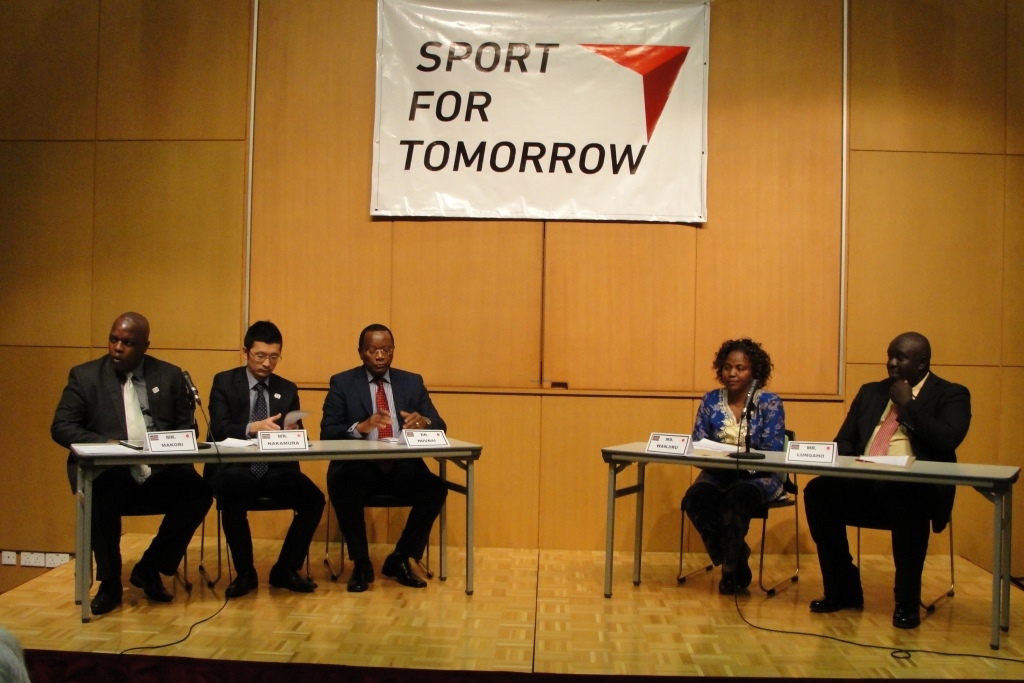 The panelist [L to R] Mr. Makori, Mr. Nakamura, Dr. Ndubai, Ms. Wanjiru and Mr. Lungaho |
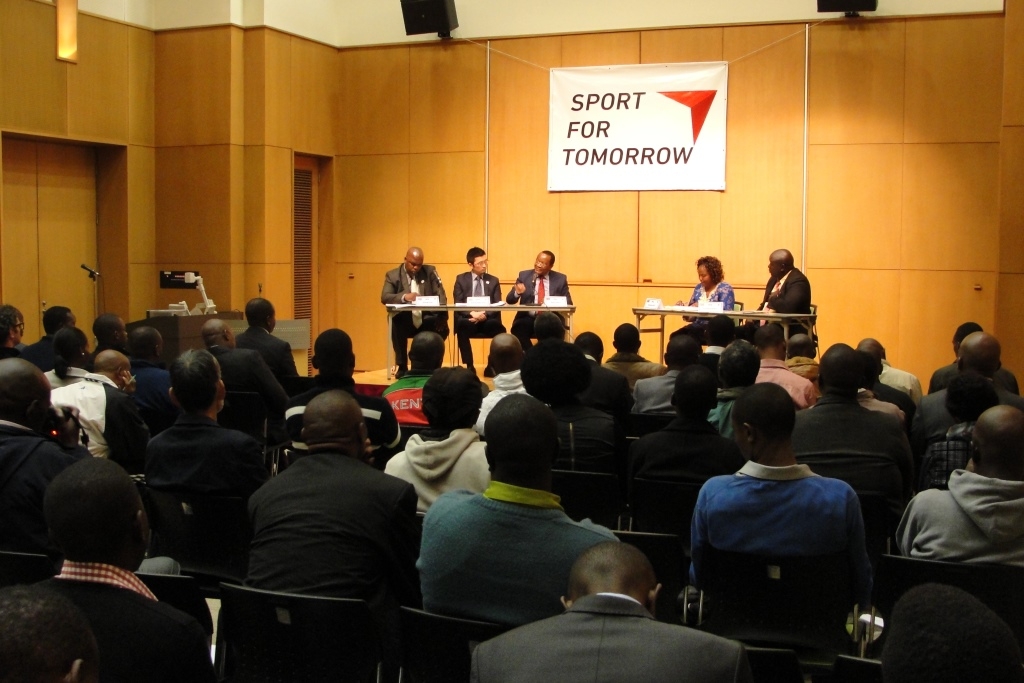 A cross section of the audience during the Japan-Kenya Policy Workshop on Sports |
The final session of the policy workshop was a question and answer session. Some of the questions raised were:
- why there is no cooperation between Japan and Kenya in the area of football
- what is being done to address the dilemma of athletes who train in Japan but lack opportunity when they return to Kenya
- the most valuable trait learnt while training in Japan
Ambassador Uesawa wrapped up the session. In his closing remarks, he stated that discipline is about how to live life. It is a lifelong endeavour.
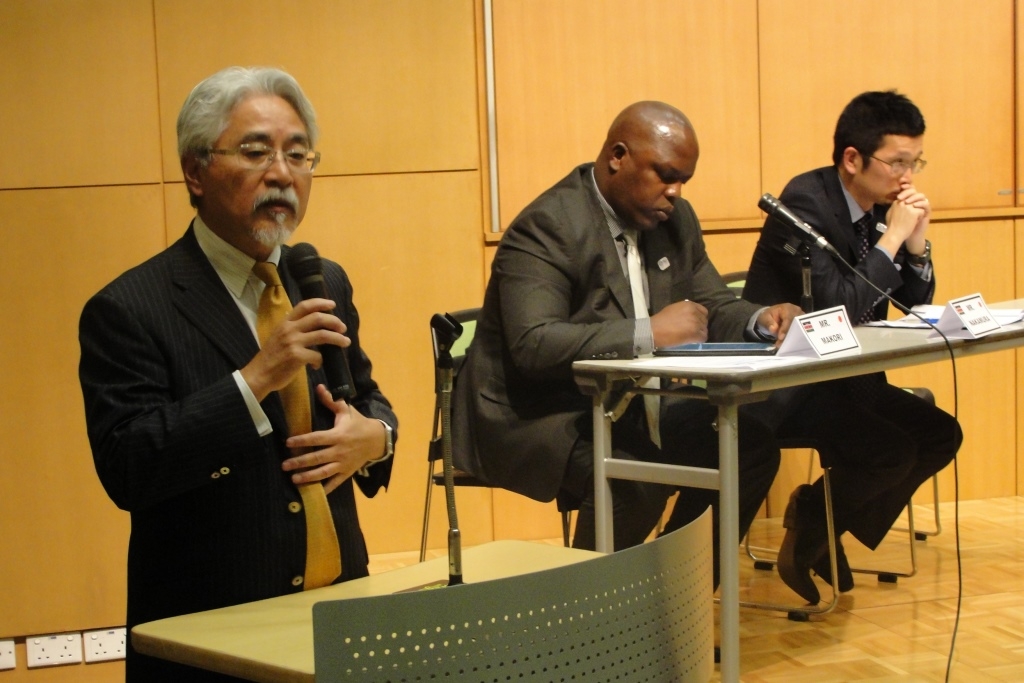 Amb. Uesawa giving his closing remarks |
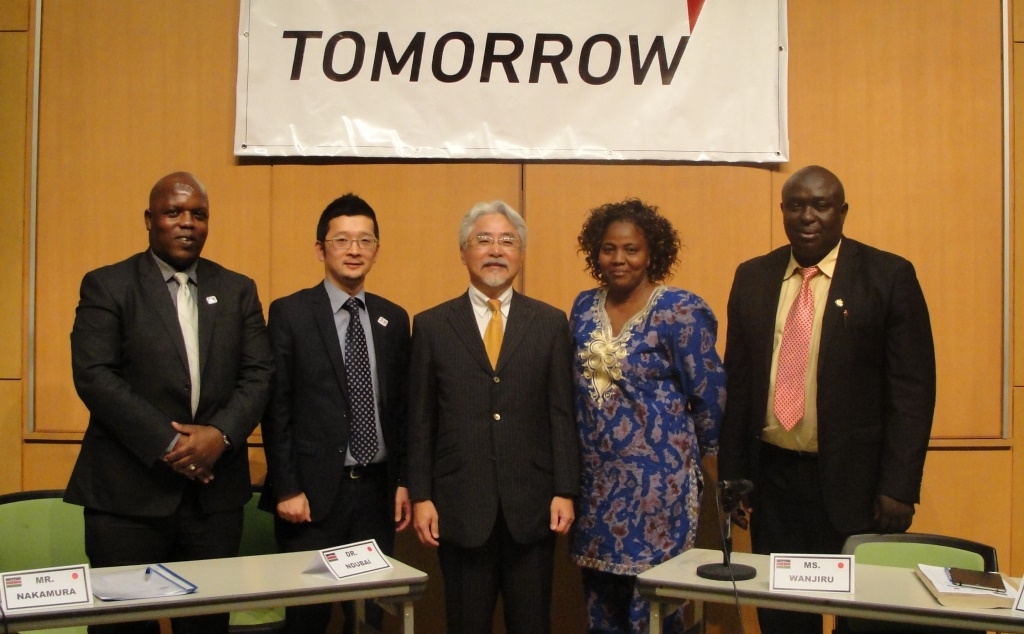 Group Photo [L to R] Mr. Makori, Mr. Nakamura, Amb. Uesawa, Ms. Wanjiru, Mr. Lungaho |
